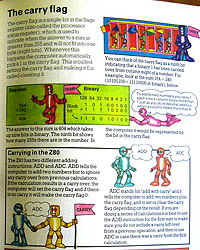History of computing

A page from one of my favourite products of the 'home computer' boom of the early eighties: Machine Code for Beginners (Usborne 1983). As the graphics suggest, this guide to raw assembler programming (now often regarded as insanely difficult) was aimed firmly at the children's market.
I've been involved with the history of computing since 2004, when I took over the Associate Directorship of the UK National Archive for the History of Computing (NAHC) as part of my role at Manchester. I'm also the UK organiser for SIGCIS, the international IT history group run within the Society for the History of Technology, and have been the UK associate partner in the Software for Europe (SOFT-EU) project, an ESF-funded collaboration looking at transnational software history.
I'm particularly interested in the early days of personal computing, and in how computers have been promoted and understood in everyday life, particularly in Britain.
I've so far supervised two research students in the field: Tom Lean (PhD 2008), who looked at home computer users and producers in Britain in the 1980s, and Ian Martin (PhD 2010), who worked on the computerisation of the British banking industry in the 1950s to 70s. I'm looking to recruit students in this area, so please get in touch if you're interested in working at Manchester.
My teaching includes an undergraduate module on the history of computing, The Information Age, and various undergrad and Masters classes on related material.
My publications (see writing) include a paper on British microcomputer platforms and compatibility and a chapter for the forthcoming SOFT-EU collection on European software, provisionally titled Computing in Many Languages. I also compile the annotated bibliography of the history of British computing, which is being developed in different versions for the SIGCIS site and other places.
